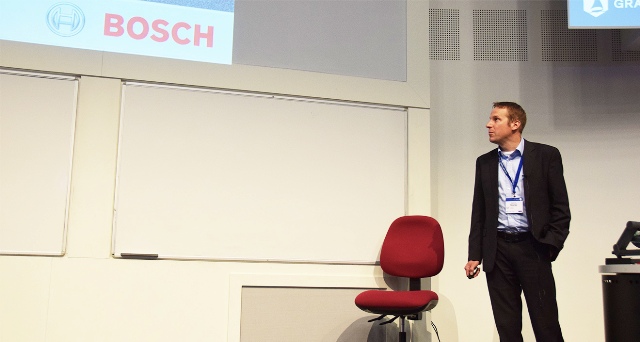Jun 30 2015
 Image Credit: Anders Frick, Chalmers University of Technology
Image Credit: Anders Frick, Chalmers University of Technology
The new graphene magnetic sensor was developed by Bosch engineers in association with the Max-Planck Institute for Solid State Research. In 2008, the company expanded its product line with the production of air quality, humidity, temperature, geomagnetic and sound pressure devices including the ones used in mobile phones. Roelver reported that Bosch is the leading supplier of microelectromechanical sensors across the globe, with €1bn sales to date.
Bosch has been testing the two-dimensional material by incorporating it into its humidity, magnetic, pressure and gas and sound pressure devices, with an aim to find out if graphene could support new applications and improve sensor performance. The initial step involved investigation of fabrication methods.
As top-down approaches such as mechanical and chemical exfoliation do not support commercial scale production of graphene devices, Bosch researchers used bottom-up approaches such as chemical vapor deposition (CVD) onto metal surfaces and thermal decomposition of silicon carbide. CVD is definitely suitable for mass production while thermal decomposition of silicon carbide may be suitable.
Roelver claimed that it would take around 5 to 10 years for the graphene-based sensor technology to compete with the prevailing technologies, owing to the lack of large-scale wafer-based and transfer-free synthesis techniques at present. Bosch and Max-Planck researchers tried different substrates and finally selected hexagonal boron nitride for its benefits of technical performance and cost.
Bosch’s magnetic sensors operate based on the Hall effect where a Lorentz force is induced on the moving electric charge carriers by a magnetic field. This results in deflection and Hall voltage that can be determined. The performance of the sensor is determined based on parameters like power consumption that varies inversely with charge carrier mobility and sensitivity, which is based on the number of charge carriers. The high carrier mobility of graphene makes it suitable for such applications.
We are pleased to see that Graphene Week has been chosen as the forum to disclose such an important technological milestone. Bosch’s call for large-area integration of graphene into industrial processes fully matches and validates the flagship’s planned investments in this critical area for the mass production of devices.
Andrea Ferrari, Chairman of the Executive Board of the Graphene Flagship
Roelver compared and contrasted materials his presentation to show that the worst case graphene scenarios approximately match a silicon reference. Similarly, the results showed a great improvement when compared to silicon, in the best case scenario. The graphene exhibited lower source current and power requirements for the corresponding Hall sensitivity. Hence, it can be concluded that graphene delivers a high-performance magnetic sensor with low footprint and power needs.
The extraordinary findings presented by Roelver result from a direct comparison of the sensitivity of a silicon-based Hall sensor and sensitivity of the Bosch-MPI graphene device. The sensitivity of silicon sensor was observed to be 70V per amp-tesla while that of the boron nitride and graphene device was 7000V per amp-tesla. This showed a remarkable two-fold increase in magnitude.